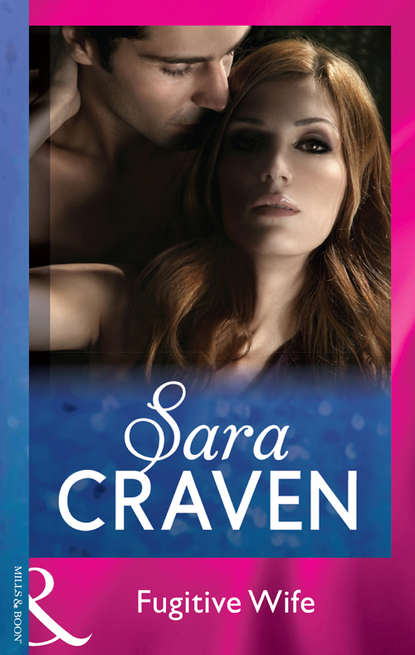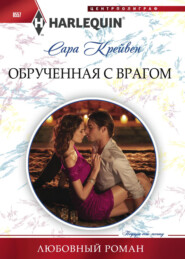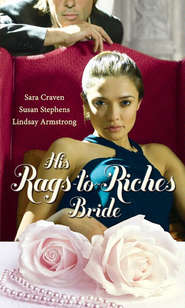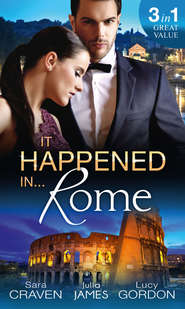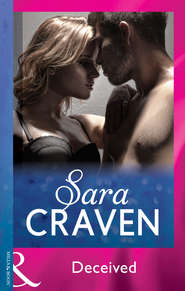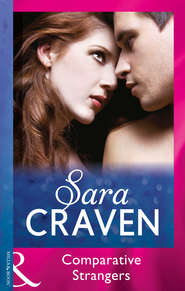По всем вопросам обращайтесь на: info@litportal.ru
(©) 2003-2024.
✖
Fugitive Wife
Автор
Год написания книги
2018
Настройки чтения
Размер шрифта
Высота строк
Поля
She bent forward and added another shovel of coal to the now brightly glowing fire, then leaned back, her eyes closed, trying to shut out the thoughts, the tantalising memories which buzzed and vibrated in her brain.
Logan standing in this very room, the usually cynical lines of his mouth relaxing into unexpected tenderness. His voice husky as he said ‘Hello, wife,’ and his arms reached for her.
At the time, she’d reckoned that to be the happiest moment of her life, happier than the actual wedding ceremony only a few hours before in London, because, then, in the register office, she’d been aware of her father’s absence and of his continuing resentment of her marriage. But here in this room, alone with Logan, nothing else had seemed to matter. Her father’s disapproval had seemed a long way away, and almost immaterial.
As Logan’s arms had closed around her, and her lips had parted eagerly beneath his kiss, it had seemed that they would share this closeness for ever, that nothing or no one could ever separate them.
A mirthless smile curved her mouth. In retrospect, that conviction had a terrible irony.
She didn’t want to look back now, to remember everything that had happened. Tomorrow, she thought, tomorrow when I’m less tired—more able to cope. But even as the thought formulated itself, she knew it was self-deception. So far she had signally failed to manage any aspect of her life. Wasn’t that why she was here? Why she had fled to this little retreat in the wilds of Yorkshire, just to escape from a situation which she could neither control nor understand. She had come, telling herself that she had to think things out. This was the reason for her presence here. She could not, must not allow herself to escape again.
Besides, memories were pressing on her brain, presenting her with images, that she believed she had safely shut away for ever. No, her mind cried out in rebellion. I don’t want to look back. I don’t want the pain of it. In the past year she had made herself a tight safe cocoon where troubling memories could not pursue her. She had thought it was impregnable, but now she recognised that for the illusion it was. Where emotions were concerned, was anyone ever totally invulnerable, she wondered?
She passed a weary hand across her eyes. Was it really only eighteen months ago that she had accompanied her father to her first really adult party since leaving school—the annual presentation of awards within the United Publishing Group in the penthouse suite of their towering City building? The girl who had arrived at the party on Sir Charles Trevor’s arm, in a secret flutter of excitement, seemed to have come from a different world. Not long past eighteen, with three good ‘A’ levels under her belt, and the world her oyster, it had seemed. Or, at least, the world as delineated by her father. It had disappointed her to discover that her dreams of university were to remain dreams for the time being. Sir Charles, it seemed, needed her to act as his hostess, and he had informed her that it would do her no harm to learn how to run the London house, and Branthwaite, his home in Berkshire. Briony had been frankly unenthusiastic at the prospect. For one thing, she could imagine the reaction from Mrs Lambert, their briskly efficient housekeeper, if she attempted to interfere in the clockwork running of either establishment. For another, she had always planned on having a career of some sort, and she told her father so.
Sir Charles had raised his eyebrows. ‘I’ve no objection to you finding yourself a job of sorts in time, Briony,’ he said. ‘But I do hope you’re not intending to turn yourself into one of these strident females, always demanding equal opportunities, and other nonsense. Besides, I did think you might wish to give me some of your time now that your full-time education has been completed. I’ve been very lonely since your mother died, and I was looking forward to your companionship.’
Which was emotional blackmail at the very least, Briony thought gloomily as she murmured reluctant acquiescence. She was neither blind nor stupid, and she was quite aware that her father had consoled himself during the latter years of his widowhood with a succession of attractive ladies, many of whom had been only too willing to act as his hostess. She wondered rather acidly whether the subtle pressures on her father to remarry had proved rather overwhelming of late, and if that was why she was being dragged kicking and screaming into the picture.
But she consoled herself with the thought that the next year or so could be fun. There would be dinners and receptions, and even trips abroad, and a greater contrast to the boarding school life of past years could scarcely be envisaged. Her father had been too busy controlling the publishing empire of which he was chairman to have paid her a great deal of attention up to now.
The dinner which had preceded the awards party had been rather a disappointment to her. She had been introduced to a number of young executives, who had paid her flattering attention, but she was realistic to know that this was what she could expect as the chairman’s daughter, even if she’d had two heads. She was not unaware of her own attractions—her slender figure, the sheen of her coppery hair, and the charm of her wide-set grey-green eyes with their heavy fringing of lashes—and was becoming used to the glances which tended to follow her these days. But at the same time she knew there had to be a happy medium between the overt flattery of the younger men at U.P.G. and the almost paternal deference of the older ones. She guessed that her father’s reputation of being a hard man to cross was responsible for the respectful distance which seemed to be maintained from them for most of the evening.
When the actual moment for the awards came, Briony quite enjoyed handing over the small silver replicas of quill pens, and the accompanying cheques, and uttering a few shy words of congratulation to writers, photographers and artists who had been merely names to her up to now.
She was just beginning to shed some of her inhibitions and enjoy being the centre of the stage, when she became aware of a man watching her across the room. For a moment their eyes met and locked, and Briony was teased by an odd sense of familiarity. But she knew he was not one of those she had met at the dinner.
And in the same moment she realised that the expression in the aquamarine-pale eyes, looking her over from head to foot, was neither paternal nor deferential. It was coolly challenging, even faintly amused, and it told Briony quite clearly and unequivocally that wherever the sex war was waged, this man would expect to emerge as a victor. Nor did she have to wonder how anyone of her age and inexperience, only recently released from the shelter of school, could have known this. It was pure instinct, and she recognised it as such.
But all the same, she turned away hurriedly, aware that embarrassment mingled with indignation was heightening the colour in her face, and was annoyed to find that her mind still retained an image of him, tall and lean, his tawny hair bleached into blond streaks, and his eyes startlingly pale against the deep tan of his face.
All she had to do, of course, was wait until her father, deep in conversation with Hal Mackenzie, the editor of the Courier, the group’s leading and influential daily paper, was free, and then ask the man’s name. But she was reluctant to do this, for reasons she only dimly perceived herself. Something told her that if her father wished her to know this man, then he would have arranged for there to be an introduction earlier in the evening.
In the event, she did not have to wait to be told who he was. When the time came for the prestigious ‘Journalist of the Year’ award to be made, and the name Logan Adair was called, he walked forward. As she picked up the award, Briony discovered crossly that the palms of her hands were damp, but she managed to present a calm exterior as Logan Adair shook hands, first with her father, who was murmuring a few conventional phrases of congratulation, and then turned to her.
She said politely, ‘Well done, Mr Adair,’ in a small, cool voice, and held out his award and envelope. Everyone else had taken their award, thanked her, shaken hands and walked away, usually back to the bar with ill-concealed relief. But not Logan Adair.
He said with elaborate courtesy, ‘On the contrary, thank you, my dear Miss Trevor,’ and his hand reached out to clasp not her fingers as she expected, but her wrist, pulling her forward towards him slightly off balance, so that she looked up in quick alarm and saw the amused glint in his eyes before he deliberately lowered his mouth to hers. The pressure was quick and light, and casual in the extreme, so there was no reason on earth why Briony should jerk back as if she had been branded, only to find the little incident had been witnessed in the loudest silence she had ever heard.
Logan Adair said smilingly, ‘A pleasure to have met you, Miss Trevor,’ and turned away.
Briony’s cheeks were stained with bright colour and her fragile poise was shaken to its core. The chatter round the room had broken out again, but too loudly, and out of the corner of her eye she saw Sir Charles, frowning thunderously, wheel on Hal Mackenzie. She wished with all her heart, in spite of her embarrassment, that her father would treat it as the joke it had undoubtedly been, or else forget it altogether, but she knew this could never happen.
Sir Charles was well known for his ambivalent attitude to the empire he controlled, she thought unhappily. He was proud of his newspapers and magazines and the influence they wielded, yet he had little time for the rank and file journalists and photographers who provided the words and pictures for his millions of readers to pore over. United Publishing had had its fair share of industrial troubles in the past, and Briony was aware that many people in the organisation believed that their chairman’s intransigent attitude towards his workforce was at least partly to blame.
‘What Charles would really like to see would be complete automation in the industry, complete with robots to press the right buttons,’ an old friend had remarked recently at a private dinner party, and though Briony had joined in the laughter which followed, the comment had troubled her slightly. It occurred to her that a newspaper’s quality was largely dictated by the people who wrote for it. People like Logan Adair, whose byline appeared above hard-hitting eye-witness reports from the trouble spots of the globe.
Briony had seen his name often in the Courier, and had looked out for his stories, relishing his laconic style and the dry humour with which he often laced the bitter truth he had to tell. She knew from comments she had heard that he was regarded as one of the feathers in the Courier’s cap, and that there were plenty of rival newspapers who would have paid over the odds to obtain his services, but she was also aware that her father did not share these sentiments.
She heard Hal Mackenzie say placatingly, ‘Sir Charles, isn’t this all rather a storm in a tea-cup?’ and walked away hastily. The presentations were over, fortunately, and someone had opened the french doors at the end of the room which led out on to the rooftop terrace. She was glad to be able to escape there, and glad too to find herself alone. If indeed she was alone. She’d only taken one long steadying breath of the crisp night air when she was aware that she was being watched, and turned quickly. When she saw just who it was standing between her and the door, she stepped back involuntarily, her heart missing a beat.
Logan Adair said acidly, ‘There’s no need to panic, Miss Trevor. Our brief encounter just now didn’t drive me so mad with desire that I’ve rushed out here to ravish you.’
‘Then why precisely did you—rush out here, Mr Adair? To insult me again?’
The pale eyes held a wry gleam as he looked at her. He said, ‘My God, that has the authentic Trevor stamp on it! As a matter of fact, I think I had some vague idea of making amends, but I’m sure your father’s daughter would regard that as a sign of weakness, so I think I’ll return to the more congenial atmosphere at the bar.’
He was already turning away as she said, ‘I’m sorry if I overreacted. You—startled me, that’s all.’
‘And not for the first time this evening.’ He shook his head slightly. ‘I always understood that sweet sixteen was the limit for never having been kissed. You’re two years out of date.’
‘How do you know how old I am?’ she demanded.
‘Elementary, my sweet. The Courier too has its gossip column, and your eighteenth birthday was featured with photographs—remember? “The lovely Briony Trevor comes of age” it said, rather predictably. Claridges, wasn’t it? My invitation must have been mislaid somewhere.’
She tried to match his own light tone. ‘You mean you would have accepted one?’
‘Probably not,’ he said drily. ‘But I think I’d make a point of being around the day you really come of age.’
There was a sudden stillness between them, a tension that was almost tangible. He hadn’t really retreated at all, Briony realised. He was still firmly entrenched between her and the door that led back to the party and safety. She felt herself becoming flustered and knew it was important to conceal the fact.
She said rather hurriedly, ‘Why did you do it? Kiss me, I mean?’
‘Call it an irresistible urge.’
‘Do you often have them?’
‘Not as often as I seem to be having them this evening,’ he said mockingly, and grinned at her. ‘I must admit the original urge was more to test the depth of that immaculate boarding school poise rather than to arouse wanton desires in your undoubtedly virginal breast. I also wanted to annoy your father.’
‘Well, you’ve succeeded in that,’ she said coldly, oddly disappointed that he apparently had seen her as a schoolgirl to be teased.
‘So I noticed. I think poor old Mac is being ordered to carpet me first thing on Monday morning—or fire me at the earliest opportunity. Probably both. And if your father realised I was alone with you now, he wouldn’t even wait for Monday morning.’
‘I think you’re exaggerating,’ she said. ‘You don’t fire the Journalist of the Year simply because he annoys you at a party.’
‘You might do,’ he said. ‘If you were Sir Charles Trevor, and if the journalist in question had been a thorn in your flesh for some considerable time.’ His lips curled slightly. ‘And as it looks as if I’m going to be hanged anyway, it may as well be for a sheep as a lamb …’
He took an unhurried step forward and his arms reached for her, drawing her effortlessly against him. ‘You should have been kissed before, Briony,’ he said huskily, and then his mouth came down on hers.
His lips were warm and seeking and very enticing. Her arms slid up around his neck, almost of their own volition, holding him closer still as the kiss deepened from the gently exploratory to the frankly demanding. In the end, it was Logan who pulled away, his breathing a little ragged, his eyes narrowing speculatively as he looked down at her.
‘I don’t know what you have in mind for the remainder of the evening,’ he said with a touch of grimness. ‘But I sure as hell know it won’t be what I’m thinking of right now, so I think you’d better return to the safety of your father’s side, Miss Trevor. Believe me, it will be better for both of us.’
‘Scared, Mr Adair?’ Briony’s heart was pounding suffocatingly as she looked up at him through her lashes. She was being deliberately provocative and she knew it, enjoying the first heady taste of a woman’s power over the man who finds her desirable.
‘Hardly, Miss Trevor,’ he drawled. ‘But I guarantee you would be, if I decided to continue this romantic moment to its obvious conclusion. Don’t play with fire, darling, because it’s a very good way of ending up scorched, and I imagine Daddy would prefer to hand you over to the bridegroom of his choice not even slightly singed.’
She felt destroyed by his cynicism. She said angrily, ‘You’re not irresistible, you know. And I’ll choose my own husband!’





